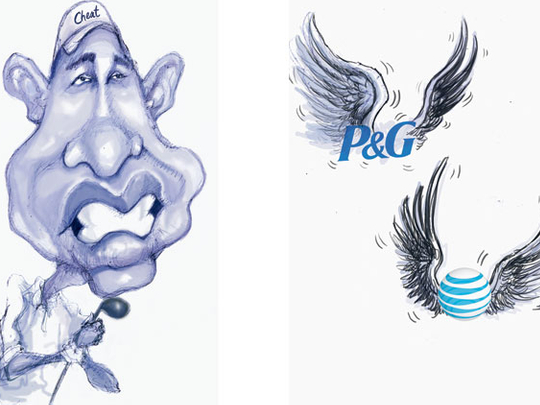
There are few sights as ridiculous as a big corporation wrestling with a moral dilemma. In the weeks since golfer Tiger Woods was embroiled in a marital-infidelity scandal, his sponsors have been hitting him into the rough.
Last week, AT&T Inc decided he is no longer the kind of clean-cut, family-friendly corporate ambassador for its products. Accenture Plc had already made the same decision.
And yet, the companies dropping Woods, 34, are guilty of two sins, both of them worse than anything he might have to put down on his scorecard when he finally checks in with St. Peter.
Stupidity, most obviously. Woods will come back from this major setback, just as celebrities from Kate Moss to the Rolling Stones have done, and probably stronger than ever.
And, more seriously, the sponsors have misunderstood why they wanted celebrity endorsements in the first place. They need authenticity, not bland corporate perfection. If corporations aren't willing to accept that their "ambassadors" are real people, with all the flaws and fallibilities that come with that package, there is no point in having them on the payroll.
You have to be amused by the priggishness and hypocrisy of the corporate honchos who have decided that Woods is about as socially acceptable as a Sunday afternoon golfer hacking divots into the fairways at St. Andrews.
Procter & Gamble Co. has said it will start phasing out Woods from promotions for its Gillette razors and shaving foams. AT&T said it was cutting all its ties with Woods. Accenture, the Dublin-based technology-consulting firm, built its marketing around his personality, but decided to drop him last month.
And for what? Murder? Terrorism? No. Just infidelity, which he has owned up to, and apologised for.
On his website, Woods issued a statement admitting he had hurt his family and saying he needed to focus on being a "better husband, father and person", an ambition that many of us could add to our list of New Year's resolutions. To further that aim, he said he was leaving competitive golf "indefinitely" — even though the implication that playing golf is somehow incompatible with becoming a better husband and father is more than a little troubling for the sport.
What exactly do these companies think they are doing?
In fairness, they thought they were getting a squeaky-clean, family-first sportsman, not someone who can't order a pizza without hitting on the waitress. And we can concede that there are some ways in which Woods isn't quite living up to the image his sponsors might want to create. The porn stars and cocktail waitresses who claim to have had affairs with Woods didn't appear to be "the best a man can get", particularly when the man in question is a billionaire sports star.
If Gillette was "limiting his role" in its marketing campaigns for not setting his romantic ambitions a little higher — perhaps an Oscar-winning actress or a European princess — that would be understandable. But for infidelity by itself? Why does Gillette think men buy those expensive multi-blade razors and top-of-the-line shaving gels, when they could just buy a no-name version for half the price? Could it have something to do with making themselves more attractive to women? And isn't it the case that some of those men won't be in happy relationships and are looking for something that may not be so long-term and mutually supportive with those other women?
As for AT&T, what does it imagine most people use phones for? The entire mobile-phone industry is designed to either get people into or out of some form of romantic entanglement. What else are text messages for? And why else would you want to hide the caller ID? So your wife doesn't know the plumber just rang?
When corporations attempt to set themselves up as moral arbiters, they just end up making themselves look out of touch.
First, no one really cares. Moss, one of the world's most well-known models, found herself in trouble in 2005 after pictures were published allegedly showing her using cocaine. Companies such as Hennes & Mauritz AB and Chanel SA promptly cancelled her contracts. Five years later, Moss is still a big brand. Likewise, the Rolling Stones packed more bad behaviour into a single tour date than Tiger Woods could chalk up in a year. Yet corporations still line up to sponsor their concerts.
Second, companies want to associate themselves with stars who have personality. The average Joe doesn't identify with Accenture's corporate-mission statements. Sponsors have to put a golfer on the brochure to get anyone to take a look because the sportsman has character and an inspiring life story. Those qualities are what people find most interesting.
But don't expect those "personalities" to be perfect. If they were, they would be as dull as the products they are promoting. And then what would be the point hiring them? It is precisely their human foibles we find appealing.
Nike Inc. and Upper Deck Co. have decided to stand by Woods. Other companies should just shrug and say, "Hey, Tiger is human: He has his good points, and his bad points, just like everyone else. We wish him well despite his troubles, and hope he finds a way of working things out with his wife. And if not, we hope they remain friends. We'll stick by him, even in difficult times, just as we hope people would stick by us if we got into trouble."
Sponsors would emerge with more respect.
Matthew Lynn is a Bloomberg News columnist. The opinions expressed are his own.












